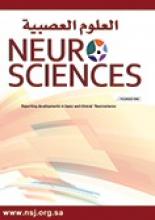Abstract
OBJECTIVE: To determine the number of brain CT scans carried out in patients with mild head injury (MHI) during 13 months of trauma registry, and to investigate means of reducing the rate of unnecessary scans.
METHODS: During a trauma registry (from August 23, 1999 to September 21, 2000) in 6 general Hospitals (Imam Hussein, Moayer, Sina, Hafteteer, Imam Khomeini and Shariatti) in Tehran, Iran, 1209 cases with Glasgow Coma Scale (GCS) score >13 underwent brain CT scan. To be included in the study, patients must have sustained their injury within one week prior to presentation to Emergency Rooms, and were hospitalized for more than 24 hours. The attending physicians formally reported all brain CT scan findings.
RESULTS: For 1209 patients, there were the following characteristics: mean age was 29.4 years; the main cause of injury was traffic accidents (60.1%), followed by falls (28.5%), fights (7.2%), and other reasons (4.2%). Seventy-seven cases (6.4%) had a GCS score of 13, 212 (17.5%) had a score of 14, and 920 (76%) had a score of 15. A total of 481 abnormalities on CT scan were reported for 405 patients (33.5%) with positive report of brain CT scan, while 804 cases (66.5%) did not report abnormalities. The most common intracranial lesion was epidural hemorrhage with 146 cases (30.3%). The rate of negative reporting of brain CT scan in patients who had GCS score of 15 was 72.2%.
CONCLUSION: Patients who have GCS score of 13 or 14 on admission should be considered to have a moderate rather than a mild head injury. For reduction of unnecessary brain CT scan performance in MHI patients, we must define the appropriate criteria.
- Copyright: © Neurosciences
Neurosciences is an Open Access journal and articles published are distributed under the terms of the Creative Commons Attribution-NonCommercial License (CC BY-NC). Readers may copy, distribute, and display the work for non-commercial purposes with the proper citation of the original work.






